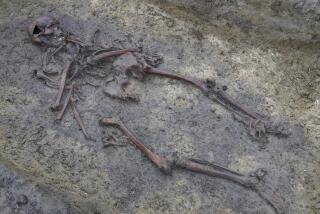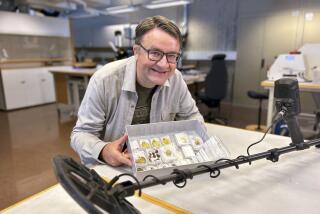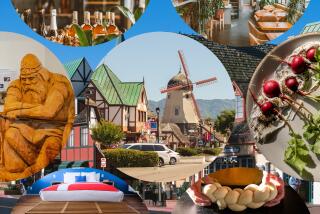Danish Village Grounded in Iron-Age History
- Share via
On a Saturday afternoon in 1952, a group of peat-cutters from the Danish village of Grauballe made a gruesome discovery. Two feet below the surface they unearthed the head of a man whose throat had been severed ear to ear.
The body was completely naked, and the hands so well-preserved that the police were called to take fingerprints. The prints were for scientific purposes; there was no chance to identify the dead person. This man, who died in his late 30s, had lived as a contemporary of Julius Caesar.
Known today as the “Grauballe Man,” he’s one of the best examples of numerous Iron-Age bodies that have been discovered naturally preserved in the peat bogs of Denmark, Northern Germany and the Netherlands. Interestingly, each individual died a violent death, perhaps a sacrifice-ceremony victim.
Today, the Grauballe Man is one of a number of fascinating exhibits at the Mosgard Prehistoric Museum, about five miles from Denmark’s second-largest city, Arhus.
The museum, which is set in a forest near a beach, offers exhibits from the Stone Age to Denmark’s Viking period. Cost is about $3 for adults, students about $1.50. It can be reached by taking bus No. 6 from the Arhus rail station, a 30-minute trip costing $1.75. The area also contains many bicycle paths. A map, costing $3, is available at the tourist information office.
Arhus, which has a population of 258,000, was founded by the Vikings 1,000 years ago. Remnants of history are everywhere. The basement of the UNI Bank, in the center of Stroget Street, is a small Viking museum focusing on life in the Arhus area in AD 900.
Inexpensive accommodations are available at a youth hostel in the middle of the city’s oldest forest, which is also a five-minute walk from a beach. The Pavillonen Youth Hostel is at Marienlundsvej 10, two miles from the city center. It can be reached by taking buses numbered 1, 6, 8, 9 or 16 from the rail station. Accommodations, in four-bedded rooms for members of national hosteling associations, is $9 per person. Nonmembers get charged an extra $4.15. The hostel is closed between noon and 4 p.m.
Those who don’t want to stay in a hostel can arrange--through the local tourist information office--for accommodations in a private home for $15.30 per person, plus a $3 booking fee. Coffee or tea is provided, and bathroom facilities are shared. Breakfast is available for $5.35. The tourist information office is in Arhus City Hall, about a two-minute walk from the rail station.
For more information, contact Denmark at the Scandinavian Tourist Boards, 655 3rd Ave., 18th Floor, New York 10017, (212) 949-2333.
Some sea travel between Scandinavian countries is included in popular European rail passes sold in the United States. Students are also eligible for the 50% discounts on the ships of Scandinavian Seaways, which include routes to Great Britain.
These huge ships provide overnight services with swimming pools, saunas, casinos, theaters, dining and duty-free shops. For details, contact a travel agent. In Britain, you can inquire at Scandinavian Seaways, DFDS Travel Centre, 15 Hanover St., London W1R 9HG.
More to Read
Sign up for The Wild
We’ll help you find the best places to hike, bike and run, as well as the perfect silent spots for meditation and yoga.
You may occasionally receive promotional content from the Los Angeles Times.






